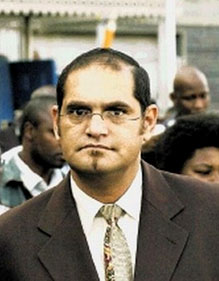
HE’S the umpteenth witness to be called, and the first since the Arms Procurement Commission was stunned by critic Hennie van Vuuren’s refusal to testify. But Shamim “Chippy” Shaik is no hors d'oeuvre.
He is in fact, critics argue, the main course – the “key figure” in the subversion and manipulation of South Africa’s controversial billion rand arms deal.
“The person who was involved with briefing the various bodies up the chain of recommendations and decisions was perhaps the most powerful of all, armed with the ability to manipulate the findings of previous bodies and present only part of the full picture all the way up to the Cabinet sub-committee,” wrote Paul Holden and Van Vuuren in what is considered by many to be the bible on the deal, The Devil in the Detail: How the Arms Deal Changed everything.
“Of course, this suggests that there was one individual who moved from the lowest level of the hierarchy up to the top, shepherding the information all the way through. And there was: Chippy Shaik.”
Holden went on to write that as chief of acquisitions, Shaik appeared as a key figure at every level of the evaluation and decision-making chain.
“Chippy Shaik sat on a total of seven different bodies during the arms deal: he was chairman of the project control board for a number of acquisitions; co-chairman of the strategic offers committee, one of the three heads of the international negotiating team; a member of the affordability team; a member of the armament acquisition steering board and the arms acquisition council; and to top it all off, the secretary of the Cabinet sub-committee that was the final stop in the arms deal chain.”
Anticipation over Chippy Shaik’s appearance
Shaik – who moved to Perth in 2007 – will testify today, becoming the first person “directly implicated” in the corruption and subversion of the deal to testify. The Arms Procurement Commission is probing allegations of fraud and corruption in the 1999 deal.
The former chief of acquisitions for the Department of Defence is the youngest of four brothers and a member of the politically-connected Shaik family – older brother Moe is the former head of South Africa’s secret service while Schabir was convicted in 2005 on two charges of corruption, one of which was soliciting a bribe from an arms deal company for President Jacob Zuma. He was sentenced to 15 years in jail.
Holden, Van Vuuren, and fellow critic Andrew Feinstein have all detailed in books how a German investigation uncovered that Chippy Shaik was the recipient of a $3-million bribe he solicited from winning bidder ThyssenKrupp.
In their book, Holden and Van Vuuren noted a memo from a ThyssenKrupp executive which read: “During one of our meetings he (Chippy Shaik) asked once again for explicit confirmation that the verbal agreement made with him for payment to be made in case of success, to him and a group represented by him, in the amount of 3 million US$. I confirmed this to him.
“Mr Shaik has emphasized that the B+V/TRT offer was pulled into first place in spite of the Spanish offer being 20% cheaper. The Spanish offset was according to him also valued higher than ours. In this respect it had, according to him, been no simple exercise to get us into 1st place.”
Allegations of procurement irregularities
He is also alleged to have been instrumental in his brother Schabir’s African Defence Systems winning a R400-million tender. According to the State in the Schabir Shaik trial, (French arms company) Thomson was informed by Chippy that it needed to resolve the situation with his brother to his brother’s convenience; failure to do so, he is alleged to have noted, would mean that he would “make things difficult” for Thomson, media reported at the time.
However, in an interview with The Star shortly before emigrating in 2007, Shaik denied all the allegations, saying a triple-agency government probe had cleared him.
“I had stayed in my job for two years while the investigation took place, I was cleared, I was never charged, and I left because I chose to do so. I had long before then told Mosiuoa Lekota, the Minister of Defence, my boss, that I wanted out. I wanted to leave for my sanity. I am a very private person and did not need that kind of nonsense in my life.
"But bang! What has happened in the media ever since then? I am said to have been suspended and fired because of the arms deal," he told the newspaper.
Critics remain unmoved
However, critics remain unmoved by Chippy Shaik’s protestations of innocence.
“The way the arms deal was structured thus provided a huge amount of space for the manipulation of the tender process: a space that was, most frequently, occupied by the chief of acquisitions, Chippy Shaik,” Holden and Van Vuuren wrote in their book.
This week Van Vuuren re-iterated that Chippy Shaik’s appearance was a “chance for the commission to confront a key player in the deal with a series of decisions that were made in violation of procurement laws”. “If the commission fails to do so, it is further evidence that it is not attempting to uncover the truth,” he said.
Van Vuuren pointed out that Chippy Shaik was one of the first people “directly implicated in corruption” to testify at the public hearings.

